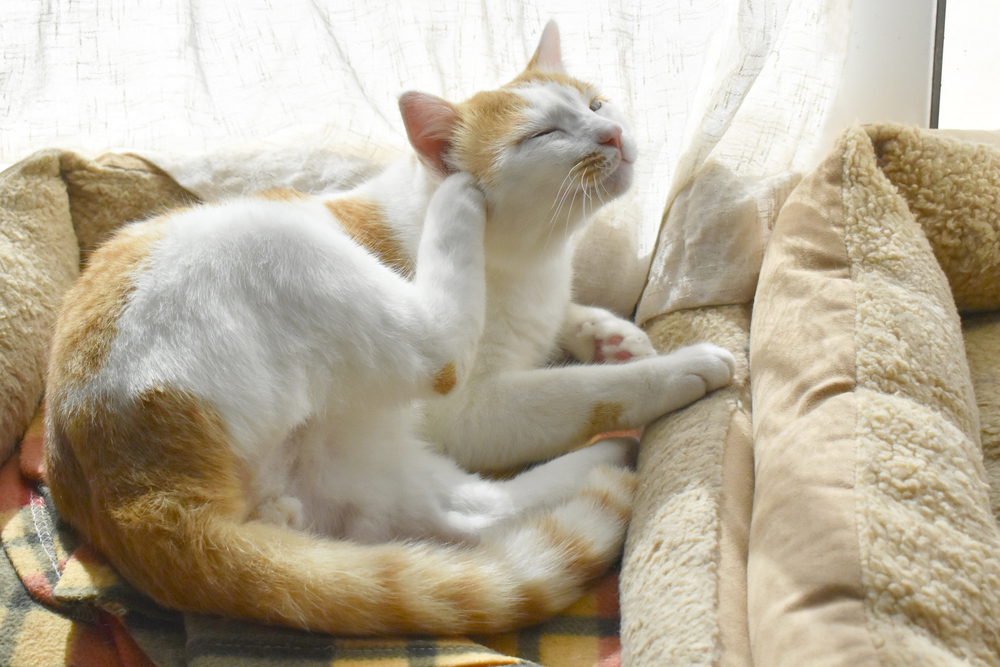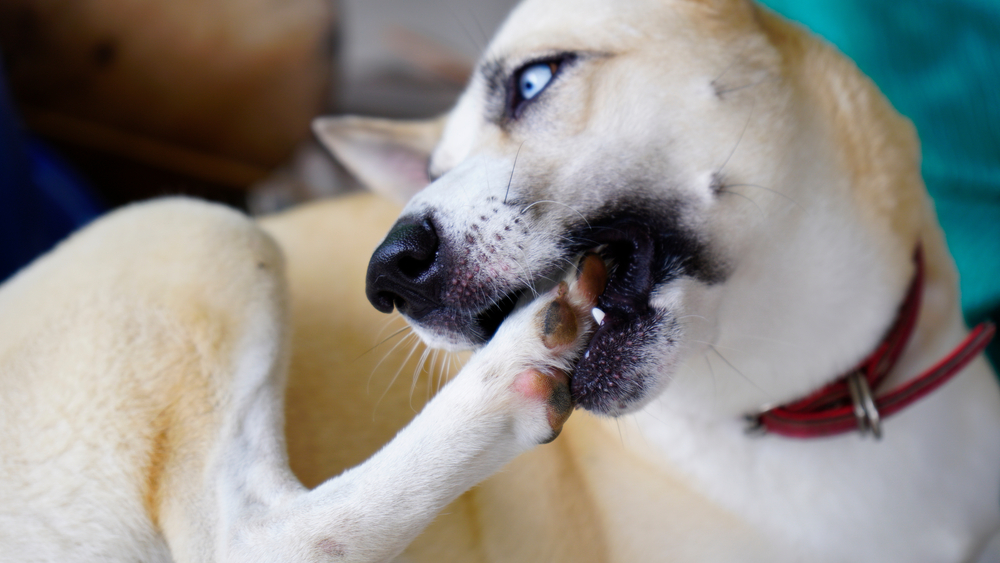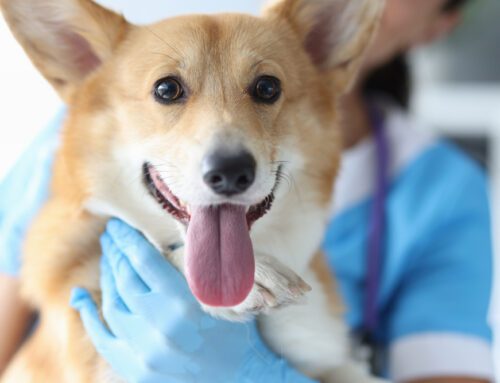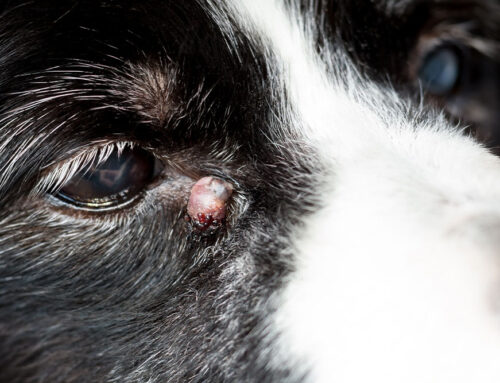Do seasonal changes have your pet itching for relief? Spring into action with this itchy pet information from the Village Animal Hospital team.
Itching is more than a nuisance
Relentless scratching, chewing, and licking are disruptive behaviors that affect your pet’s comfort, health, and daily routine, and are much more than a noisy nuisance—persistent itchiness (i.e., pruritus) is rooted in a medical cause and, left untreated, can result in increasingly irritating complications. These include:
- Secondary bacterial or fungal infections
- Self-trauma (e.g., bite wounds, sores)
- Acute moist dermatitis (i.e., hot spots)
- Lick granulomas
- Parasitic infestations
- Irritability
- Generalized anxiety
Breaking the cycle of irritation and injury that these consequences create can be challenging. If your pet is unusually itchy, your first step should be to schedule an appointment at Village Animal Hospital.
Digging deep: The itchy pet exam
Itchiness is a common clinical sign for numerous pet conditions and disorders that can range from mild to severe. An accurate diagnosis is essential to ensure targeted and effective relief. Our ears-to-tail itchy pet assessment includes:
- Thorough history-taking — The patient history involves gathering information about potential irritants in your pet’s environment. You’ll be prompted to provide information about common triggers, such as:
- New foods or treats
- New household products (e.g., cleaners, detergents)
- Flea and tick preventive use
- Grooming
- Itchiness onset (e.g., warmer weather, after visiting the dog park)
- Outdoor environment (e.g., wooded area, contact with stray pets)
- Emotional and behavioral wellness
- Other clinical signs, such as vomiting, diarrhea, or lethargy
- Comprehensive physical examination — In addition to the standard exam, our veterinarian will focus on your pet’s skin and coat, looking for visible irritated areas, hair loss, skin thickening, flea droppings (i.e., flea dirt), moisture, wounds, rashes, lesions, and pain.
- Diagnostic testing — Depending on the physical findings, our veterinarian will recommend specific testing to isolate the cause of your pet’s pruritus. These tests may range from simple to complex, and include:
- Flea dirt — Flea droppings (i.e., digested blood) turn rust-red when wet.
- Skin scrape or impression — Microscopically reviewing your pet’s skin cells and flora can reveal mites, bacteria, and fungal yeast.
- Blood testing — Itchy skin can indicate an endocrine (i.e., hormone-related) disorder that can be diagnosed with blood work.
- Ear cytology — Concurrent ear infections and generalized itchiness may indicate an allergy. Our veterinarian will swab your pet’s ear and review the sample for microscopic bacteria and yeast.

Common causes for itchiness in pets
Pruritus can be more than skin deep. Here are a few of the most common causes we treat at Village Animal Hospital.
- Allergies (i.e., atopy or allergic dermatitis) — Although some environmental allergens cause upper respiratory signs in pets, most allergic responses are manifested through the skin. Like people, pets can be allergic to various environmental substances, including airborne (i.e., inhaled) allergens, food allergens, and by direct contact. Common allergy triggers include:
- Seasonal allergens — These include grasses, weeds, and tree pollen. Pets’ irritation worsens during spring and summer.
- Environmental allergens— Ever-present allergens, such as mold, mildew, and dust, cause year-round misery for allergic pets.
- Food allergens — Despite popular misconceptions, proteins, including chicken, lamb, beef, and soy, are the most common food allergens for pets—not grains. Digestive signs (e.g., loose stool, diarrhea, bloating, vomiting, or gas) are common food allergen responses.
- Flea allergy dermatitis (FAD) — Some pets react with severe hypersensitivity to flea saliva. Intense itching is a classic FAD sign.
- Flea allergy dermatitis (FAD) — Some pets react with severe hypersensitivity to flea saliva. Intense itching is a classic FAD sign.
- Fleas — Fleas are tiny, flat, wingless parasites that feed on warm-blooded pets. By the time you recognize an adult flea on your pet, many more are likely hiding—and breeding—in the surrounding environment. Flea bites cause itching, irritation, and hair loss in adult pets and can transmit harmful diseases to pets and people. If your itchy pet isn’t on a year-round flea and tick prevention plan, use a flea comb and check for flea dirt along their spine and at the tail base.
- Mange mites — Scabies mites are microscopic parasites that burrow into and feed on your pet’s skin, triggering an inflammatory response. Pets address this intense irritation by scratching at the affected areas—namely their face, abdomen, chest, and legs—causing visible scabs and hair loss. Sarcoptic mites are highly contagious and zoonotic (i.e., they can be transmitted from pets to people).
- Skin infection — Bacterial and fungal infections arise in response to self-trauma (e.g., bite-wounds, scratches), reduced air flow to the skin (e.g., dirty hair), trapped moisture, decreased immunity, and disruption to the skin’s normal microscopic flora. These infections cause local or generalized itching and mild to significant skin changes (e.g., flaking, lesions, crusts, moist discharge, and odor).
- Anxiety — Stress, fear, and boredom can trigger compulsive behaviors such as repetitive scratching and licking. Anxious or nervous pets may initially perform these actions for their self-soothing benefits but, unfortunately, they can result in secondary infections and self-trauma. This can sometimes make determining which came first (i.e., the emotion or the behavior) extremely difficult, and long-term treatment is delayed. However, once the pet’s stress is appropriately managed, often through medication and behavior modification, the compulsive scratching or licking will diminish.
If your pet is unusually itchy, they may need more than a basic bath. Contact our American Animal Hospital Association (AAHA)-accredited Village Animal Hospital to schedule your pet’s appointment and soothe their endless itch.








Leave A Comment